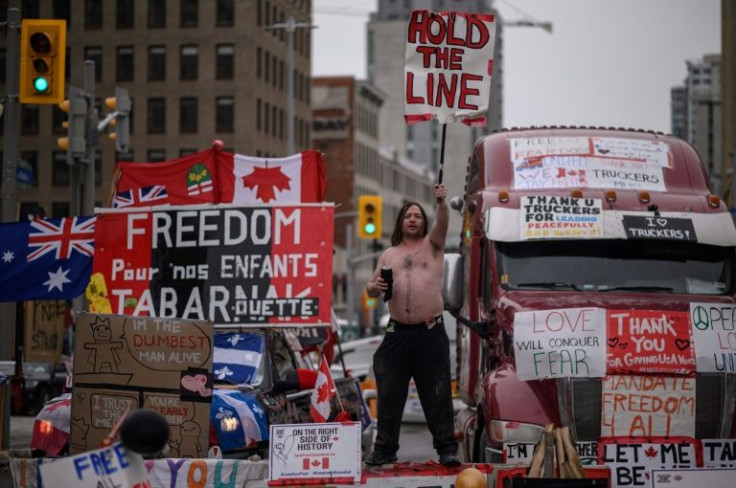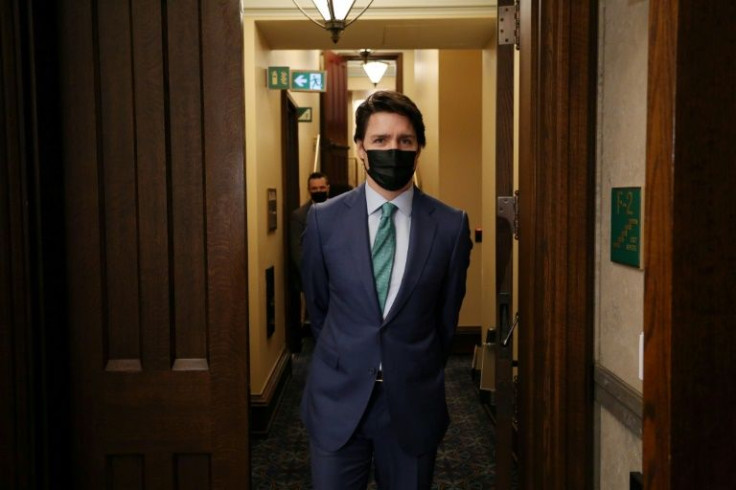Canada Police Ready To Move In To Clear Trucker-led Protests
Canadian police massed in the capital Thursday, readying to clear a trucker-led protest that has choked Ottawa's streets and provoked the government to call on rarely-used emergency powers.
With barricades going up overnight and a heavy police presence forming in the area where hundreds of big rigs remain parked, Prime Minister Justin Trudeau was in Parliament nearby defending his decision to invoke the Emergencies Act for only the second time in peacetime.
"Illegal blockades and occupations are not peaceful protests," Trudeau told the House of Commons, adding: "They have to stop."
In response to critics, he said the Act was not being used to call in the military against the protesters, and denied restricting freedom of expression.
The objective was simply to "deal with the current threat and to get the situation fully under control," he said.
Early Thursday groups of police officers could be seen unloading from buses and filing into the parliamentary precinct in Ottawa where the trucks have been parked for weeks.
Truckers had been given an ultimatum late Wednesday by the capital city's interim police chief to "leave the area now," or risk arrest and truck seizures.

In a statement, Chief Steve Bell said "a methodical and well-resourced plan" would be carried out over the coming days "to take back the entirety of the downtown core and every occupied space."
"Some of the techniques we are lawfully able and prepared to use are not what we are used to seeing in Ottawa," he said. "But we are prepared to use them... to restore order."
Truckers responded by blaring horns well into the night -- despite an extension Wednesday of a court order against the deafening noises, obtained by an area resident fed up with the disruptions.
One of the protest leaders, Tamara Lich posted a tearful video to say she was expecting to be arrested. "I think it's inevitable at this point... I'm okay with that," she said.
She also called on supporters to flood the capital, saying truckers already in place "are gonna stay and fight for your freedom."
"If you can come to Ottawa and stand with us, that would be fantastic," she said. "I want you to keep fighting the good fight."

Facing growing pressure to dislodge the protesters, Trudeau this week invoked rare emergency powers to end the demonstrations occupying Ottawa and until recently blocking border crossings to the United States.
The move marked only the second time in Canadian history such emergency powers have been invoked in peacetime; the last was nearly 50 years ago, by his father, former prime minister Pierre Trudeau.
Justin Trudeau told reporters Wednesday that with police getting help from various other law enforcement units, they should now "be able to begin their actions."
"It's time for this to end," he said.
In documents filed to the Commons, the government laid out its rational for invoking the emergency powers, saying the trucker convoy has created a critical and urgent situation that cannot be dealt with under any other Canadian laws.
It cited "a risk of serious violence and the potential for lone actor attackers to conduct terrorism attacks."
In a letter to provincial premiers, Trudeau decried the protests as "a threat to our democracy."
"It is affecting Canada's reputation internationally, hurting trade and commerce, and undermining confidence and trust in our institutions," he added.
The so-called "Freedom Convoy" started with truckers protesting against mandatory Covid vaccines to cross the US border, but its demands have since grown to include an end to all pandemic health rules and, for many, a wider anti-establishment agenda.
At its peak, the movement also included blockades of a half-dozen border crossings -- including a key trade route across the Ambassador Bridge between Windsor, Ontario and Detroit, Michigan.
The last border blockade in Manitoba was lifted Wednesday when demonstrators voluntarily left.
At other crossings, police this week arrested dozens of protesters, including four people charged with conspiracy to murder police officers at the border checkpoint between Coutts, Alberta and Sweet Grass, Montana.
They also seized dozens of vehicles, as well as a cache of weapons that included rifles, handguns, body armor and ammunition.
© Copyright AFP {{Year}}. All rights reserved.





















